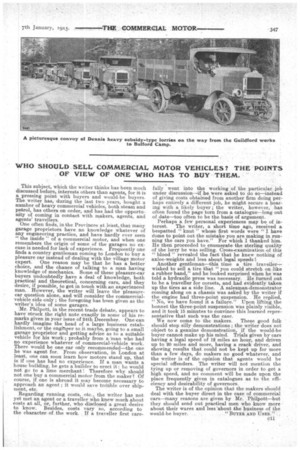WHO SHOULD SELL COMMERCIAL MOTOR VEHICLES? THE POINTS OF VIEW OF ONE WHO HAS TO BUY THEM.
Page 13

If you've noticed an error in this article please click here to report it so we can fix it.
This subject, which the writer thinks has been much discussed before, interests others than agents, for it is a pressing point with buyers and would-be buyers. The writer has, during the last two years, bought a number of heavy commercial vehicles, both steam and petrol, has others on order, and has had the opportunity of coming in contact with makers, agents, and agents' travellers.
One often finds, in the Provinces at least, that many garage proprietors have no knowledge whatever of any engineering practice, and have hardly ever seen "the inside" of a commercial motor, and when one remembers the origin of some of the garages no excuse is needed for lack of experience. Frequently one finds a country gentleman coming to London to buy a pleasure car instead of dealing with the village motor expert. One reason may be that he has a better choice, and the chance of talking to a man having knowledge of mechanics. Some of these pleasure-car buyers undoubtedly have a deal of knowledge, both practical and theoretical, concerning cars, and they desire, if possible, to get in touch with an experienced man. However, -the writer will leave the pleasurecar question alone, and will consider the commercialvehicle side only ; the foregoing has been given as the writer's idea of some garages.
Mr. Philpott, in the recent trade debate, appears to have struck the right note exactly in some of his remarks given in your issue of 24th December. One can hardly imagine the head of a large business establishment, or the engi'neer to it maybe, going to a small garage proprietor and getting advice as to a suitable vehicle for his work ; probably from a man who had no experience whatever of commercial-vehicle work. There would be one car only recommended—the one he was agent for. From observation, in London at least, one can soon learn how motors stand up, that is if one has had no experience. If a man wants a house building, he gets a builder to erect it : he would not go to a lime merchant ! Therefore why should not one buy a commercial motor from the maker ? Of course, if one is abroad it may become necessary to approach an agent: it would save trthible over shipment, etc.
Regarding running costs, etc., the writer has not yet met an agent or a traveller who knew much about costs at all, or, further, who disclosed a great desire to know. Besides, costs vary so, according to the character of the work. If a traveller first care fully went into the working of the particular .job under discussion---if he were asked to do so—instead of giving costs obtained from another firm doing perhaps entirely a different job, he might secure a hearing with a likely buyer ; the writer, however, .has often found the page torn from a catalogue—long out of date—too often to be the basis of argument. Perhaps a few personal experiences may be of interest. The writer, a short time ago, received a bespatted " knut " whose first words were "I have dome to point out the mistake you are making in running the cars you have." For which I thanked him. He then proceeded to enumerate the sterling quality of the lorry he was selling. Cross-examination of this " blood ' revealed the fact that he knew nothing of axlee-weights and less about legal speeds Another gentleman—this time a tire traveller— wished to sell a tire that "you could stretch on -like a rubber band," and he looked surprised when he was told a hydraulic press was necessary. He turned out to be a traveller for corsets, and had evidently taken up the tires as a side line. A salesman-demonstrator coming along on a chassis was asked by the writer if the engine had three-point suspension. He replied, "No, we have found it a failure." Upon lifting the bonnet the three-point suspension was plainly visible, and it took 15 minutes to convince this learned representative that such was the case.
We now corne to the makers. These good folk should stop silly demonstrations ; the writer does not object to a genuine demonstration, if the would-be buyer cannot make up his mind Trials given by cars having a legal speed of 12 miles an hour' and driven up to 20 miles and more, having a crack driver, and showing results that could not be kept up for more than a few days, do makers no good whatever, and the writer is of the opinion that agents would be special offenders. The writer will not mention the tying up or removing of governors in order to get a high speed, and no comment will be made upon the place frequently given in catalogues as to the efficiency and desirability of governors.
The writer is of the opinion that the makers should deal with the buyer direct in the case of commercial cars—many reasons are given by Mr. Philpott—but they should send out practical men who know more about their wares and less 'about the business of the weuld-be buyer. "BUYER AND USER."


















